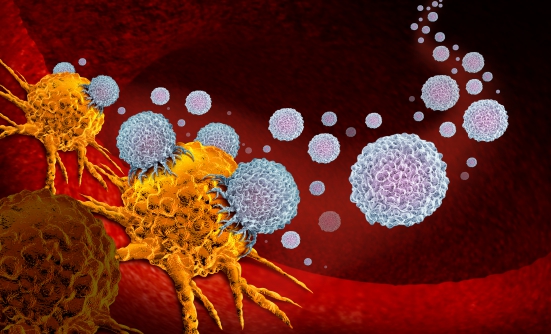The body’s immune system is amazing. It is incredible at fighting off viruses, parasites, and infections, such as the common cold or the flu. The immune system is continuously patrolling our body, acting as a defense system to eliminate these threats. So it only makes sense that the immune system would also try to wipe out cancer cells. The problem is that cancer cells are not recognized as foreign elements in the body, and, therefore, they are left alone by the immune system.
Cancer is smart. It evolves and learns how to evade an attack from the immune system. And every person’s cancer can react differently. This is why people with healthy immune systems can still have cancer. But although cancer is smart, we are becoming smarter at learning how to fight it. Through immunotherapy drugs, we can now begin to train our immune systems to recognize cancer and attack it.
How Does Immunotherapy Work?
So how does immunotherapy work? Imagine that the white blood cells (also called T-cells) of the immune system are like police who patrol the body, looking for problems day in and day out. Now imagine cancer cells as the bad guys in disguise. They hide behind a protein called PD-L1, which acts as a “fake ID badge.” When immune cells approach cancer cells, they look for identification (PD-L1) to determine if a cell is welcome or not. If everything appears to match up, they move along.
Immunotherapy drugs, also known as checkpoint inhibitors, have been designed to alter the interaction between the T-cells (police) and the cancerous cells (bad guys). Immunotherapy swipes the “ID badge” away from the cancer cell, so that when the T-cell approaches, the cancer is recognized as a foreign body, and it is attacked. This is different from conventional therapies, such as chemotherapy or radiation, which target “good” and “bad” dividing cells.
A New Era of Cancer Treatment
Immunotherapy is not a new concept. In fact, it was being researched as early as the 1890s. However, in this new era of cancer treatment, we are finally understanding how to expose cancer cells to the immune system for what they are: diseased cells that must be eradicated. This unique mechanism—called checkpoint inhibition—allows us to use the body’s natural defense system (the immune system) to keep it healthy.
Checkpoint inhibitors are now approved by the FDA for treatment of several cancers, including bladder cancer, head and neck cancer, kidney cancer, lung cancer, melanoma, and Hodgkin lymphoma.
Side Effects of Immunotherapy
Typically, immunotherapy drugs are administered intravenously every 2 to 3 weeks. Although immunotherapy drugs are currently approved by the FDA to be used alone, promising studies now show that using immunotherapy in combination with chemotherapy or with other immunotherapy, and even with radiation therapy, can be beneficial. Overall, in my experience, most patients tolerate immunotherapy well. However, because every person is different, everyone responds to treatment differently, and that also applies to immunotherapy.
Side effects associated with immunotherapy drugs may include fatigue, diarrhea, skin rash, or itching. If the immune system becomes too activated with immunotherapy, however, it can negatively attack healthy organs, such as the colon, liver, lungs, or the endocrine system.
Typically, patients have fewer side effects when they receive immunotherapy than with chemotherapy, because only the cancerous cells, not the healthy cells, are being targeted by the immunotherapy drug. More extreme side effects may occur with treatments such as chemotherapy or radiation, in which all dividing cells are targeted—the good and the bad cells. (This is why patients often have hair loss during chemotherapy.)
Although many people are reporting that they have a good quality of life and are able to continue their daily activities when they receive immunotherapy, for patients who are struggling with immunotherapy, several supportive therapies—including nutritional support, naturopathic medicine (supplement use), physical therapy, or mind–body medicine—may help to combat the side effects.
Patients who are struggling with side effects of immunotherapy should discuss this with their medical oncologist; they may need steroids to reverse the immune-stimulating side effects.
Who Should Consider Immunotherapy?
Several advancements have been made in immunotherapy, and currently, patients with different types of cancer may benefit from it. However, much work remains to be done. If your cancer is not responding to conventional treatment with surgery, chemotherapy, or radiation, and no FDA-approved immunotherapy is available for your specific cancer, talk to your oncologist to see if a clinical trial is right for you.
Although clinical trials are experimental, and the outcomes are unknown, the more research that goes into immunotherapies, the more we learn and the more treatments we find that could be potentially life-saving for your specific cancer and for other cancers.
A listing of active clinical trials can be found on www.clinicaltrials.gov, with descriptive criteria for each trial.
Hope for the Future
The American Cancer Society estimates that in 2017, as many as 1,688,780 patients will be diagnosed with cancer in the United States. Although this number is large, it is also important to note how many patients are living longer with cancer today, and are receiving treatment for cancer like a chronic disease.
The National Cancer Institute reports that between 1975 and 1977, the 5-year relative survival rate for all cancers was only about 50%. Fast track to the period from 2006 to 2012, and the 5-year relative survival rate increased to about 65%.
Every day, we make strides and advancements in the treatment of cancer, and immunotherapy is a very large part of this progress. We hope that through research, we can find more ways to harness the power of immunotherapy. My dream is that we will be able to move further and further away from chemotherapy and radiation, and see a larger number of immunotherapies used to treat and cure more types of cancer.
Patient Resources
American Cancer Society
www.cancer.org/treatment/treatments-and-side-effects/treatment-types/immunotherapy.html
National Cancer Institute
www.cancer.gov/about-cancer/treatment/types/immunotherapy
American Society of Clinical Oncology/Cancer.Net
www.cancer.net/navigating-cancer-care/how-cancer-treated/immunotherapy-and-vaccines/understanding-immunotherapy
Society for Immunotherapy of Cancer
www.sitcancer.org/patient
















